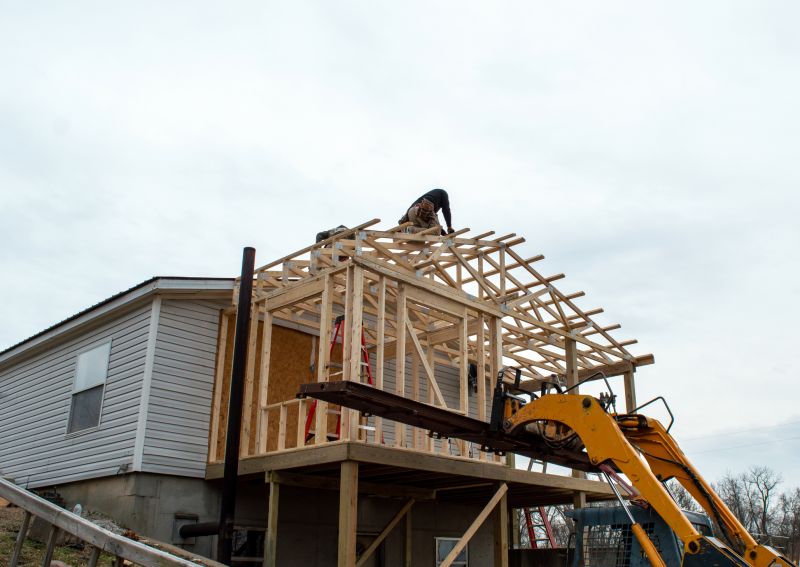Leading Selection of Products For House Expansion and Renovation
Get insights into the most effective products that support structural integrity and aesthetic appeal in home additions.
 Expanding a house through additions requires careful planning and the right selection of products to ensure safety, durability, and functionality. When constructing an extension, a variety of materials and components come into play, from foundational elements to finishing touches. Properly chosen products can facilitate smooth construction processes and long-lasting results, making the new space an integrated part of the existing home.
Expanding a house through additions requires careful planning and the right selection of products to ensure safety, durability, and functionality. When constructing an extension, a variety of materials and components come into play, from foundational elements to finishing touches. Properly chosen products can facilitate smooth construction processes and long-lasting results, making the new space an integrated part of the existing home.
Top Overall Option
Modular Framing System
A modular framing system offers versatility and efficiency for house additions, providing a customizable framework that simplifies assembly and ensures structural stability. These systems often feature pre-engineered components that can be adapted to various design specifications, reducing construction time and labor costs while maintaining quality standards.
Types of Products For House Addition Constructions
Lumber and Timber
Essential for framing walls, floors, and roofs, providing structural support for the addition.
Concrete and Cement
Used for foundations, footings, and slabs to create a stable base for the new structure.
Insulation Materials
Helps regulate indoor temperature and improve energy efficiency within the addition.
Drywall and Wall Panels
Provides interior wall surfaces that can be painted or finished to match existing decor.
Roofing Materials
Includes shingles, metal panels, and underlayment to protect the addition from weather elements.
Flooring Options
Varieties such as hardwood, laminate, or tile to complete interior surfaces.
Windows and Doors
Vital for natural light, ventilation, and access, available in numerous styles and sizes.
Electrical Wiring and Fixtures
Supports lighting, outlets, and appliance connections within the new space.
Plumbing Components
Includes pipes, fittings, and fixtures necessary for bathrooms and kitchens.
HVAC Equipment
Ensures proper heating, ventilation, and air conditioning for comfort.
Weatherproofing and Sealants
Protects the addition from water intrusion and air leaks.
Exterior Cladding
Materials such as siding or stucco that enhance aesthetic appeal and durability.
Fasteners and Connectors
Includes nails, screws, brackets, and anchors essential for assembly.
Soundproofing Materials
Reduces noise transfer between the addition and existing spaces.
Lighting Fixtures
Provides illumination and ambiance for interior spaces.
Popular Choices
Simplifies interior wall installation with ready-to-assemble panels.
Ideal for outdoor spaces connected to the addition, offering low maintenance.
Enhances natural light while improving insulation and reducing energy costs.
Adds natural light to interior spaces, creating a brighter environment.
Provides effective airflow and ventilation within the new space.
Supports modern automation and connectivity features in the addition.
Offers exterior protection with a variety of styles suitable for additions.
Provides a smooth base for various flooring types and enhances durability.
Adds safety features to interior walls, especially in shared or multi-use spaces.
Facilitates leveling and stabilization during construction.
Illuminates outdoor areas and enhances security around the addition.
Eases installation and provides reliable connections for plumbing fixtures.
Improves energy efficiency and security for entry points.
Seals gaps and joints, preventing water and air infiltration.
Provides energy-efficient, discreet lighting options for interiors.
Helps regulate temperature and moisture buildup in the attic or roof space.
For any house addition, structural integrity is paramount. This involves selecting appropriate framing materials, foundation supports, and roofing systems that can withstand local conditions and provide stability. Interior elements such as insulation, drywall, and flooring are equally important to create a comfortable and cohesive environment. Additionally, electrical systems, plumbing fixtures, and HVAC components must be integrated seamlessly to meet modern standards and occupant needs.
Choosing the right products also involves considering ease of installation and compatibility with existing structures. For example, modular building components can speed up construction timelines, while versatile finishing materials allow for customization and aesthetic consistency. Safety features like fire-resistant barriers and weatherproofing materials also play a crucial role in safeguarding the new addition over time.
Ultimately, the success of a house addition depends on selecting products that balance quality, cost-effectiveness, and suitability for the specific project. Consulting with professionals and thoroughly researching product options can help ensure that every element contributes to a durable, functional, and attractive extension that enhances the overall value of the home.
Key Buying Considerations
- Compatibility with existing home structures and materials
- Durability and resistance to local weather conditions
- Ease of installation and availability of professional services
- Energy efficiency features for insulation and windows
- Compliance with local building codes and safety standards
- Material quality and manufacturer reputation
- Cost-effectiveness over the long term
- Aesthetic matching with existing home design
- Availability of warranties and customer support
- Environmental factors such as moisture, temperature, and pests
- Flexibility for future modifications or expansions
- Weight and size constraints for structural support
- Ease of maintenance and cleaning
- Compatibility with existing electrical and plumbing systems
- Delivery lead times and supply chain reliability
This content may contain affiliate links. We may earn a commission if you make a purchase through these links, at no additional cost to you.
